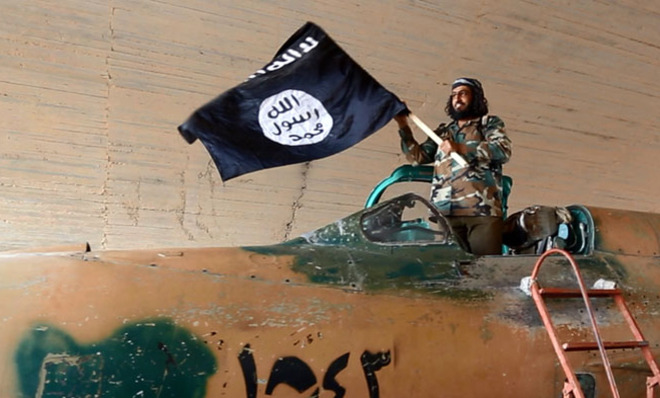What Obama must do to beat ISIS
An extensive air campaign needs an effective, reliable ground partner and a political plan. At present neither exist.

A free daily email with the biggest news stories of the day – and the best features from TheWeek.com
You are now subscribed
Your newsletter sign-up was successful

It appears inevitable: The U.S. is preparing to expand its military campaign against ISIS from Iraq into Syria, where the extremist movement birthed its proto-state.
U.S. officials have argued that ISIS is an "imminent threat" to U.S. interests. In my trips to Gaziantep, Turkey, where many Syrian activists have been sheltering, I heard laments of their violent tyranny and vociferous calls for Western intervention.
Despite the very real ISIS problem, military action against the movement in Syria presents a far more complicated case than Iraq. Rushing to war without adequately shaping a strategy to account for the challenges could backfire — leaving fewer available options to counter it and potentially strengthening its grip.
The Week
Escape your echo chamber. Get the facts behind the news, plus analysis from multiple perspectives.

Sign up for The Week's Free Newsletters
From our morning news briefing to a weekly Good News Newsletter, get the best of The Week delivered directly to your inbox.
From our morning news briefing to a weekly Good News Newsletter, get the best of The Week delivered directly to your inbox.
Beating ISIS — cash rich and well-equipped with heavy weaponry — would require an extensive air campaign with an effective, reliable ground partner and a political plan. At present neither exist.
In Iraq, the U.S. was able to deploy airpower to reinforce Kurdish Peshmerga forces, known for their fighting prowess and real commitment to routing ISIS. In Syria, there is no entity with similar standing. The Iranian-backed Assad regime, rejected by the West, has been committing its own appalling war crimes, including barrel bombing population centers, gassing citizens, and arresting and torturing innocent civilians on a scale that rivals ISIS. An about face on Assad would not only risk damage to American credibility but also alienate Gulf allies in the region and moderate Syrian opposition elements.
The U.S. and Iran may be able to find common ground on the need to defeat ISIS but achieving a political consensus on the future of Syria remains elusive.
But neither can the U.S. rely on the current Syrian opposition, plagued by chronic divisions and severely weakened by its two-front war of attrition against ISIS and Assad. Some analysts argue that a U.S. air campaign combined with the proper arming of rebels would boost morale, reverse the attrition, and enable moderate fighters to do the job on the ground. But it is unlikely that in-fighting and social divisions could be resolved or managed without significant, multifold investments made over time, including at least some U.S. ground presence.
A free daily email with the biggest news stories of the day – and the best features from TheWeek.com
More realistic is a combined ground force operating within a strategic political framework premised on a power-sharing solution. Such an agreement is far off.
An effective strategy must also include regional powerbrokers — Saudi Arabia and Iran, the two main proxies in Syria. A regional alliance is necessary to successfully take on ISIS, but also to prevent a back slide into the sectarian contest that served as feeding ground for extremism in the first place. The U.S. has been pursuing a reset with Iran on the nuclear file. Talks have thus far excluded formal discussions on Syria. The U.S. and Iran may be able to find common ground on the need to defeat ISIS but achieving a political consensus on the future of Syria remains elusive.
Broad international commitments, including numerous states, including Turkey and European nations, are also essential to stem the tide of foreign recruits and end illicit trade with ISIS.
Most significantly, any military intervention must minimize civilian suffering in a region already overburdened by horrific violence and massive Syrian displacement. Addressing Syrian needs and interests is not a minor issue given that the humanitarian catastrophe in the country is in part what has allowed ISIS to flourish as it swept into conquered territory delivering services and imposing order to wanting populations. And any sound stabilization plan must account for Syrian — and Iraqi — grievances that led to the national conflicts ISIS has been exploiting.
If, as is anticipated, the White House seeks out Congressional approval for an expanded campaign against ISIS, it will need to account for these gaps. The tragic execution of American journalist James Foley presents an opening to begin making a case, but given President Obama's standing policy of retrenchment and the challenges of acting in Syria, it will take a much more developed policy to garner — sustain — public support for the kind of campaign needed to make a difference against ISIS and for the people of the region.
Sign up to get The Weekly Wonk, New America's digital magazine, delivered to your inbox each Thursday here.
More from The Weekly Wonk...
-
 How the FCC’s ‘equal time’ rule works
How the FCC’s ‘equal time’ rule worksIn the Spotlight The law is at the heart of the Colbert-CBS conflict
-
 What is the endgame in the DHS shutdown?
What is the endgame in the DHS shutdown?Today’s Big Question Democrats want to rein in ICE’s immigration crackdown
-
 ‘Poor time management isn’t just an inconvenience’
‘Poor time management isn’t just an inconvenience’Instant Opinion Opinion, comment and editorials of the day